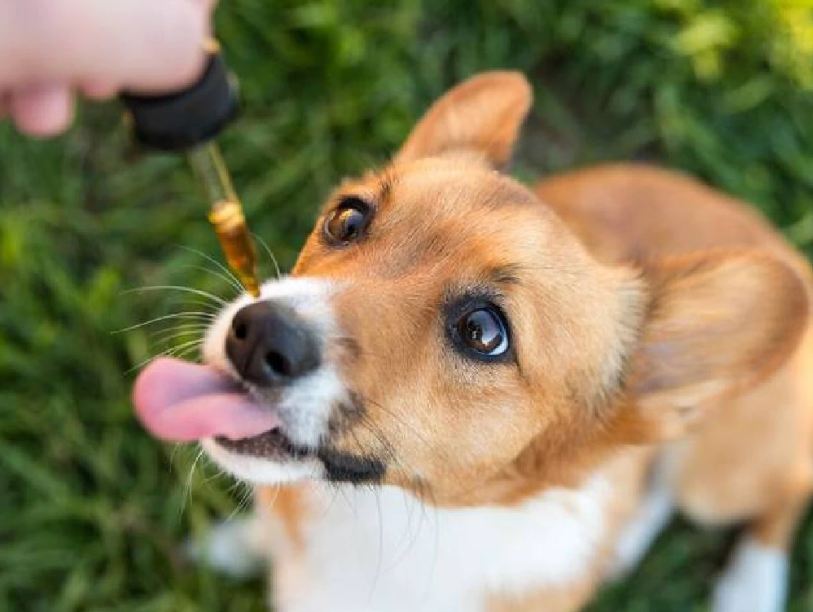10 Amazing Health Benefits of CBD For Senior Dogs

The landscape of cannabis use is rapidly changing in the Western world.
Cannabis and its derivatives are increasingly used as a medical treatment and are even moving towards being legalised recreationally as well.
With the increase in interest regarding its health benefits, it is not surprising that this curiosity has expanded to include our furry friends.
Cannabidiol (CBD) is a class of cannabinoid found in cannabis plants. Importantly, CBD is does not have the psychoactive properties associated with some other cannabinoids.
Even as early as 1988, the effects of CBD have been studied in dogs. However, a strong background of scientific research providing evidence for its beneficial effects in dogs is lacking.
Additionally, there are little reports on how well it is tolerated, as well as its long-term side effects.
This article will discuss what is known about the health benefits of CBD in dogs and other mammals based on scientific studies
Hemp, Cannabis, Marijuana, CBD, THC… – what are the differences?

You might have seen lots of different words for these compounds used interchangeably but understanding the differences between each is important.
Cannabis and marijuana generally refer to the same thing: the plants from which the components we are referring to are derived (Cannabis sativa, Cannabis indica, and Cannabis ruderalis). Cannabinoids are a class of chemicals that can be found in these plants.
The cannabinoid associated with psychoactive effects of the cannabis plant is Tetrahydrocannabinol, more commonly referred to as THC.
Hemp, also known as industrial hemp, is a specific strain of the Cannabis sativa plant species which contains low THC (less than 0.3%). Industrial hemp is used for a variety of applications, including fabrics, biofuel, paper and nutrition.
Cannabidiol (CBD) is the primary non-psychoactive cannabinoid found in cannabis plants. Industrial hemp contains high levels of CBD, and low levels of THC.
In contrast, some other strains of cannabis contain more than 20% THC, and lower levels of CBD. CBD does not induce a “high”.
THC is heavily regulated in many countries. However, CBD is sold as a herbal supplement due to its popularity as an alternative/complementary medicine, as well as its general health benefits.
Its legal status can be confusing, and legitimate research surrounding its effects is limited.
What is the endocannabinoid system

The endocannabinoid system is found in nearly all animals. It was initially discovered during a search for the targets of THC.
The psychotropic effects of THC have slowed down research into their therapeutic effects. However, their recent surge in popularity has and will likely continue to promote further research.
The endocannabinoid system describes two receptors in the cell, and the factors that they bind to. These receptors are called CB1 and CB2 (or CBR1 and CBR2) and are belong to a special class of receptors called G-protein coupled receptors.
In the body, they are bound by a class of endogenous cannabinoids called the endocannabinoids, as well as cannabinoids such as CBD and THC.
CB1 and CB2 have lots of important roles in the body, including cell signalling, metabolism, immune function, neuroprotection, and various neural processes.
They span the membrane of the cell, where they are involved in signalling processes in lots of different cell types.
CB1 is primarily found in the cells of the brain and central nervous system, CB2 is primarily found in cells of the immune system
Ten health benefits of CBD in dogs

1. Reduction of pain and inflammation
One of the major beneficial properties of CBD is thought to be in analgesia – pain relief.
This is corroborated by a study assessing owners perceptions of hemp products for dogs, with over 60% of respondents reporting that they felt hemp products provided pain relief for their pets.
Another recent survey has found that vets find CBD to be most effective in managing chronic pain.
Even more convincingly, a controlled study looking at the effects of CBD in dogs with osteoarthritis found that dogs were in less pain following treatment.
This was measured using a standardised system by vets blinded to the study. This report demonstrated that CBD was readily bioavailable, and that treatment twice daily with 2mg/kg of CBD increased the comfort and activity of dogs suffering from osteoarthritis.
However, this was a short-term study, and longer-term research is required.
A molecular study has also found that CBD reduced pain and inflammation in a rat model using various behavioural and biochemical measures, suggesting a molecular mechanism for CBD’s effects in chronic pain.
2. Helps to lessen seizures
Seizures are unfortunately a commonly reported neurological disorder in dogs. According to Pedigree, in older dogs, seizures are often a symptom of another disease.
A recent small study found that dogs CBD treatment significant reduced the frequency of seizures in dogs with epilepsy.
Further research is necessary, but the findings of the study are supported by other experiments showing that CBD has anticonvulsant properties, as well as anecdotal evidence suggesting CBD has helped to manage epilepsy in humans and other animals.
3. Can improve the quality of life in the face of chronic illness
If you have an older dog suffering from a chronic or terminal illness, you want to make them as comfortable as possible.
Some conditions and/or their treatments (such as strong painkillers like tramadol) can actually diminish a dog’s quality of life. By, for example, causing nausea, drowsiness, loss of appetite, and frequent vomiting.
Some owners have turned away from traditional treatments in favour of using CBD, or have incorporated CBD into a treatment regime for their pets.
CBD is much less likely to have strong side effects, and could make your old dog more comfortable, relaxed, active, and happy in their final years.
4. Potentially boosts the immune system
Whilst there are no studies assessing the effects of CBD on the immune system in dogs, the beneficial effects of cannabis are thought to be closely linked to the immune system.
This is because of the presence of CB receptors in immune cells, where they are thought to play a role in inflammation.
Effects of CBD on the immune system have also been shown in other animal models, where important immune genes were shown to be switched on in response to treatment.
5. Reduces anxiety and worry
Anxiety is a frequent symptom that people use CBD to treat, and its positive effects are not limited to humans. CBD is also frequently discussed as a treatment for anxiety in pets.
In fact, stress and anxiety were found to be one of the areas in which vets observed the most positive effects of CBD, and is often cited as a reason for pet owners turning to hemp products for their dogs.
It has garnered lots of positive research in humans, but clinical research in dogs is lacking.

6. Helps to increase mobility
One of the main ways a dog’s quality of life can be reduced in old age is a lack of mobility. This can be caused by arthritis, muscle weakness, and can be secondary to various other disorder.
CBD treatment twice per day was shown to enhance mobility in dogs suffering from osteoarthritis. This was observed by vets in a controlled study.
Whilst more evidence is lacking in dogs, a recent article reviewing CBD in Multiple Sclerosis in humans advised that CBD could be used as a potential therapeutic agent to enhance mobility, and anecdotal evidence suggests individuals have had success with this kind of treatment.
7. Aids cancer treatment
Whilst it is irresponsible to suggest that CBD can treat or cure cancer in dogs, it could help to lessen the effects of the disease. This includes its effects on pain, inflammation, and mood.
Additionally, the endocannabinoid system is thought to be at least partially involved in cancer progression, and cannabidiols could potentially have anti-cancer effects, such as reducing cell proliferation and migration, and promoting cancer cells to undergo cell death.
CBD should not be used in place of other treatments for complex diseases such as cancer, but could be used as part of a treatment plan. You should discuss any queries with your vet.
8. Improves brain function and health
CBD is an antioxidant, helping to defend the cells from potentially damaging molecules called reactive oxygen species (ROS).
Antioxidants are known to have neuroprotective capabilities, protecting against neural inflammation. This is thought to reduce the development of many neurogenerative conditions.
However, most of this research comes from humans and other species, and further studies into CBD’s effects on brain health are required.
9. Promotes good cardiovascular health
The endocannabinoid system has also been shown to have positive effects on heart rate and blood pressure, as it promotes the dilation of blood vessels and protects against inflammation in the cardiovascular system.
CBD can also reduce heartbeat irregularities and damage to the heart during a heart attack.
This research has been primarily carried out in rodent models, and further research into canines is required. However, potential anecdotal evidence has been reported.
10. Improves sleep behaviours
There is evidence in both rats and humans that CBD can improve sleep quality and duration.
This is thought to reflect an anti-anxiety effect of cannabinoids. Whilst no direct studies have been carried out in dogs, anecdotal evidence suggests that your pet could benefit from improved sleep with CBD treatment.
What CBD products are available for my pooch?

If you decide to incorporate CBD into your dogs diet or treatment plan, there are a large number of commercially available products to try.
These include oils, treats, dental sticks, capsules, creams, and diffusers. The choice of which is best for your dog might be down to trial and error, depending on your dog, lifestyle, and symptoms you are trying to treat.
A recent study found that CBD oil delivered orally provided the best exposure compared to capsules or transdermal creams, so this might be a good place to start.
It is important to buy from a reputable source. The FDA don’t have to approve CBD products, so there is a lot of variability on the market.
Reputable sources will be transparent about their testing procedures (which should be carried out by a third party) and results obtained. Such quality assurances can be found by looking at the Certificate of Analysis.
The bottom line
A report published in 2016 found that over half of pet owners questioned used a hemp product, and that dog owners generally used the products for illnesses such as cancer, arthritis, anxiety and seizures.
Interestingly, only 7% of people surveyed thought that hemp products did not help their animal at all; most pet owners thought they were even better than other treatments.
One potential problem halting the use of CBD in pets, is that vets almost never initiate conversations about CBD.
This was largely due to them being unsure about its legality, as well as their lack of knowledge and experience in using CBD as a therapeutic agent.
Helpfully, the vets interviewed in this study were overwhelmingly in support of more research surrounding the health benefits of CBD.
With the growing interest in the health benefits of CBD in dogs, as well as the anecdotal evidence surrounding its effectiveness, there are likely to be more clinical studies coming out in the future.
Well-controlled clinical trials will be able to either refute or verify the evidence, whilst also considering safety and limitations.


